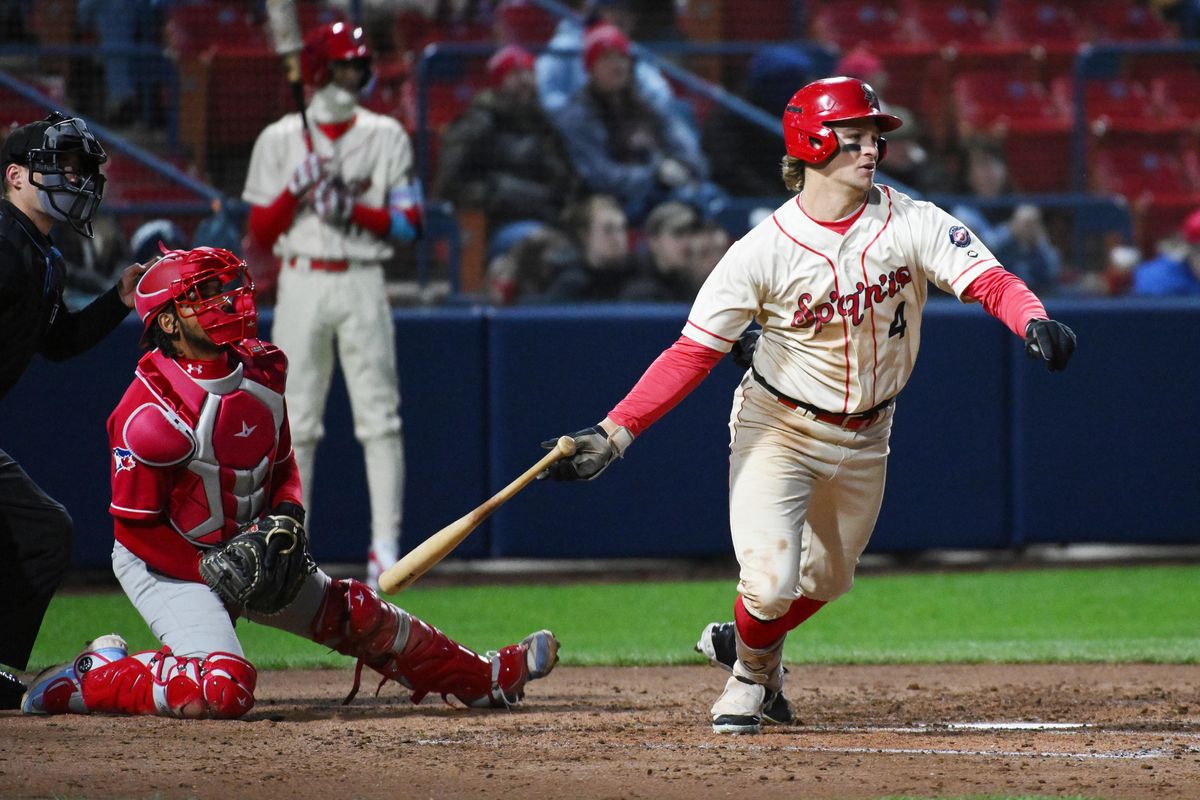‘Hair on fire’: Cole Carrigg brings energy, speed, athleticism to multiple positions for Spokane Indians

The first thing that comes up in any scouting report about Spokane Indians multiposition prospect Cole Carrigg is that he “plays with his hair on fire.”
It has slightly different connotations, depending on the person the phrase is being applied to, but it is most commonly meant to describe a player who goes all out, regardless of the situation – sometimes to the detriment of their own well-being.
“To me, all that means is just giving it 100% every time I go out on the field,” Carrigg said after batting practice at Avista Stadium last week. “I don’t really think it has anything to do with performance or skills or anything like that. It’s just giving my best effort 100% of the time. I’ve always played that way. That’s just kind of who I was when I was little and it stuck with me ever since.”
That type of effort may have developed from trying to keep up with his brother, four years his senior.
“He always pushed me to be better and try to compete with him and his friends,” he said.
Players like Carrigg, who turned 22 on Wednesday, are called spark plugs, firebrands or catalysts. MiLB.com calls Carrigg the Colorado Rockies’ No. 8 prospect – though no one’s quite sure which position he might settle into yet. He was listed as catcher for the 2023 MLB draft, when he was selected 65th overall by the Rockies. He’s listed there as well on the Indians’ roster.
But he has yet to play the position in Spokane. He has spent much of the season in center field, with a few reps at shortstop. That versatility was one of the reasons the Rockies picked him so high out of San Diego State, where he played every position except first base.
“Whatever is gonna help the ballclub more is what I like to do,” Carrigg said. “I like playing short. I like playing center. I’ve played catcher my whole life.”
Carrigg had “a little hand issue” during spring training, so for now the organization plans to ease him off catcher for a little bit.
“Let me run around and play short and center and then hopefully next season or offseason, get back into the catching a little bit and see what they want to do,” he said.
A big part of Carrigg’s offensive profile is speed and athleticism, which plays better in a position where he isn’t getting beaten up all season.
“You gotta catch all the guys in the bullpens all day and especially during spring training, you’re out there seven or eight bullpens a day,” he said. “I think it’s more of that that takes the wear and tear on your legs for sure. But yeah, center and short, definitely takes that off. I always felt like I did a good job handling that. I never felt like it got to me too much. But there’s definitely a difference when you’re catching every day and catching all those bullpens and stuff.”
Through 20 games this season, Carrigg is hitting .270/.352/.446 with two homers and 13 RBIs and has walked more than he has struck out.
He is tied for third in the Northwest League with 12 stolen bases out of 15 attempts. Teammates Braiden Ward (first, 16 of 18) and Dyan Jorge (sixth, 9 of 9) are also among the leaders. They often follow each other in the batting order.
“Speed is definitely something that affects the game in a in a big way,” Carrigg said. “If (Ward) gets on first, he might be on third with one out if he steals two bags. Same with me. Get up for Jorge. And then you know, on to the bigger guys who do a little bit more damage. But yeah, it’s definitely a big factor. It puts pressure on the defense. You’ve got to play faster and make better throws.”
Another aspect of his repertoire at the plate is switch-hitting, something he’s done since he was a kid.
“I kind of always did it in the backyard playing Wiffle ball and in the cage,” he said. “My dad took me to one of his buddies he played with in college … he told my dad, ‘Stick with it. Don’t ever drop it.’ So from there on I put it in my game and used it the rest of the way.”
Carrigg isn’t one to set goals, other than “being the best player I can be.”
“I don’t really like setting goals for myself because, honestly, I think that just implements failure,” he said. “The hardest thing to do in baseball is be successful. A lot of people set extravagant goals and if you come up short, you feel like you failed. … I’m gonna try to help the team win ballgames and get us in a good spot and hopefully push for the postseason.”
A long-term goal is making the big leagues. He described his first spring training at the Rockies’ camp as “surreal,” but after the initial jitters Carrigg felt like he was able to fit in.
“I feel like coming from high school and you start getting those college offers and stuff like that, (baseball as a career) kind of becomes a reality,” he said. “And then once you start playing well in school, you start talking to a lot more teams. So I feel like each step makes it more of a reality. So it’s not as surreal as maybe it would be when you’re 10 years old, you know, each step prepares you for it. So I felt like once I got to college, it was almost expected at that point.”